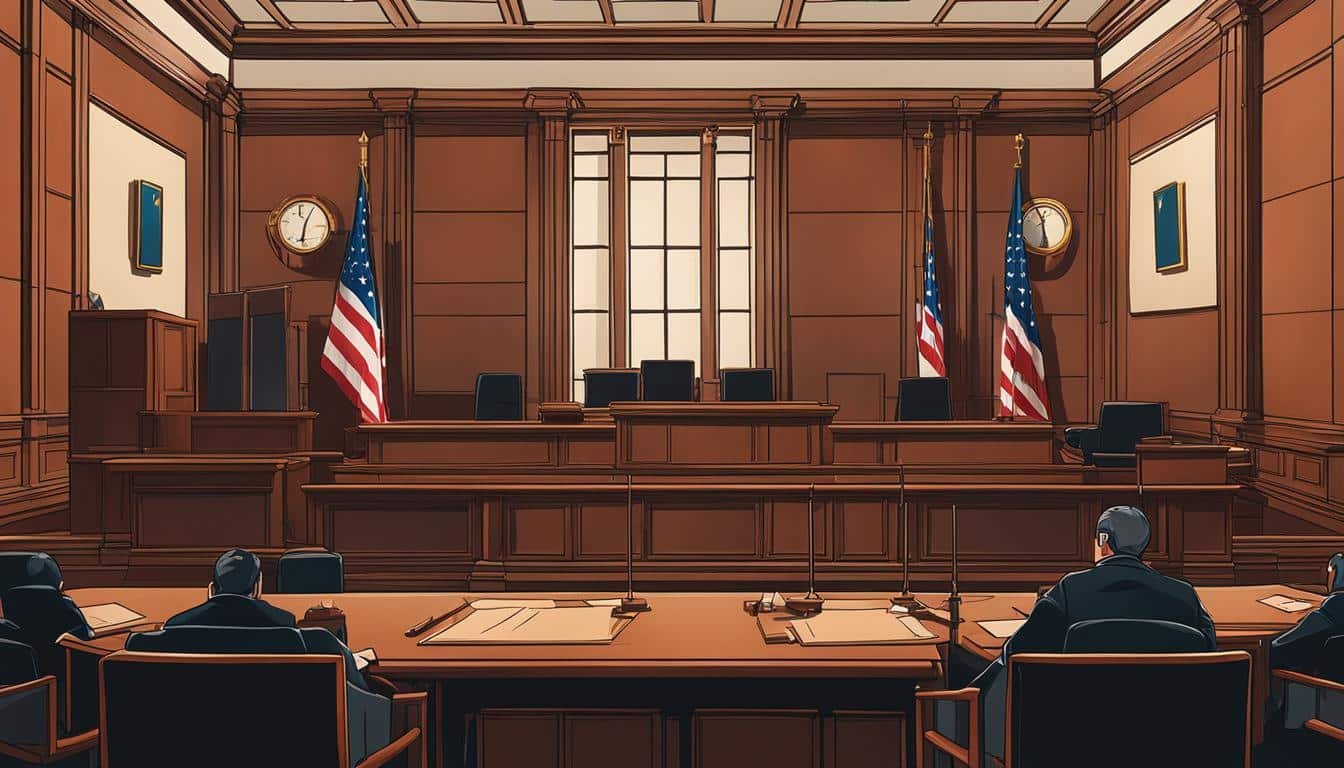Are you facing obscenity charges and in need of effective legal defense strategies? Navigating the legal process can be daunting, but with the right guidance, you can mount a strong defense. In this article, we will discuss 12 proven strategies that can help you protect your rights and achieve a favorable outcome.
Key Takeaways:
- Understanding the legal defense strategies for obscenity charges is crucial when facing potential criminal charges.
- With the right defense strategy, you can effectively navigate the legal process and protect your rights.
- These strategies are derived from various sources and cover a wide range of defense tactics.
- Equipping yourself with effective defense strategies can empower you to confidently face obscenity charges.
- By taking the time to understand these strategies, you can better safeguard your interests and mount a strong defense.
Understanding Prosecutorial Decision Making in Obscenity Cases
Prosecutorial decision making in obscenity cases is a complex process influenced by various factors. This section will delve into the considerations that shape the choices made by federal prosecutors when deciding which cases to pursue. It is essential to comprehend the broad reach of federal criminal law and the discretion granted to prosecutors in order to gain insight into this decision-making process.
One key factor that influences prosecutorial decision making in obscenity cases is the influence of local and national political culture. Prosecutors are often sensitive to the political preferences of their communities, particularly when they face elections. This political context can shape their willingness to pursue obscenity prosecutions, as they may be influenced by the prevailing attitudes and beliefs of their constituents. Understanding the impact of political culture is crucial to grasp the factors driving prosecutorial decision making.
To further complicate matters, federal prosecutors also weigh the priorities set by the current presidential administration. The influence of these priorities can significantly impact obscenity prosecutions. For example, during the Reagan administration, the Meese Commission Report on Pornography led to a heightened focus on prosecuting obscenity crimes. The section will delve into the role of the attorney general and how they shape prosecutorial priorities to align with administration goals.
The Role of Prosecutorial Discretion
In obscenity cases, prosecutorial discretion plays a significant role. Federal prosecutors possess the authority to determine how aggressively to pursue these cases, considering the legal, political, and social implications. This discretion is exercised through various strategies, such as “charge stacking,” where prosecutors use multiple charges to navigate competing political forces and appease contradictory constituencies. However, these strategies can sometimes result in mixed signals that undermine the deterrent effect of obscenity prosecutions.
This section aims to shed light on the intricacies of prosecutorial decision making in obscenity cases. By understanding the factors at play, such as political culture, presidential administration priorities, and prosecutorial discretion, you can gain valuable insights into how these decisions are made and their potential impact on the outcome of obscenity prosecutions.
| Factors Influencing Prosecutorial Decision Making in Obscenity Cases |
|---|
| Influence of local and national political culture |
| Impact of presidential administration priorities |
| Use of prosecutorial discretion |
| Strategies like “charge stacking” |
The Role of Local Political Culture in Obscenity Prosecutions
In obscenity prosecutions, the role of local political culture cannot be overlooked. Local prosecutors, especially those facing elections, are responsive to the political preferences of their communities. Understanding the cultural context in which a prosecution takes place is crucial when assessing the likelihood and intensity of legal action.
Local political culture encompasses the values, attitudes, and beliefs held by residents in a specific jurisdiction. It influences the priorities and decisions of elected officials, including prosecutors. In cases involving obscenity charges, the prevailing political climate can significantly impact the likelihood of pursuing legal action and the severity of the charges.
For example, in conservative communities with strong religious or moral convictions, prosecutors may be more inclined to aggressively pursue obscenity cases to align with the values of their constituents. Conversely, in more liberal or progressive areas, prosecutors may take a more lenient approach, prioritizing other criminal issues or considering obscenity charges to be of lesser importance.
The Impact of Local Political Culture on Prosecutorial Decision Making
In some cases, local political culture can directly influence the priorities and decisions of prosecutors. Political ideologies, community expectations, and even electoral considerations can shape the prosecutorial strategy regarding obscenity offenses. To illustrate the influence of local political culture, consider the following hypothetical scenarios:
- In a conservative community with a strong emphasis on upholding traditional values, a local prosecutor might focus resources on pursuing obscenity cases as a means of satisfying the community’s expectations and demonstrating a tough stance on moral issues.
- In a more liberal jurisdiction where individual freedom of expression is highly valued, a prosecutor may prioritize other criminal offenses over obscenity charges, viewing them as less significant in comparison.
These scenarios highlight the impact of local political culture on prosecutorial decision making. It is important to recognize and analyze this influence when considering the likelihood and severity of obscenity prosecutions in different jurisdictions.
| Factors Influencing Obscenity Prosecutions | Impact on Local Political Culture |
|---|---|
| Community values and moral beliefs | Can lead to increased focus on obscenity prosecutions in conservative communities |
| Electoral considerations | Prosecutors may align their actions with popular sentiment to secure reelection |
| Political ideologies | Influences the overall approach to criminal prosecutions, including obscenity cases |
Overall, understanding the role of local political culture in obscenity prosecutions is essential for comprehending the motivations and actions of prosecutors in different jurisdictions. By recognizing how community values and electoral considerations shape prosecutorial decision making, one can gain valuable insights into the dynamics of obscenity cases and the potential outcomes.
The Influence of Presidential Administration Priorities on Obscenity Prosecutions
Presidential administration priorities play a significant role in shaping the focus and intensity of obscenity prosecutions. One notable example is the Meese Commission Report on Pornography during the Reagan administration, which propelled a conservative and evangelical push for stricter enforcement of obscenity laws. This report, published in 1986, provided the foundation for increased federal prosecutions of obscenity crimes.
Under the influence of this report, the Reagan administration prioritized combating and prosecuting obscenity offenses, leading to a surge in investigations and prosecutions during that time. This shift in priorities was driven by political and cultural factors, as conservative and religious groups sought stricter enforcement of obscenity laws in line with their values. The attorney general, as the head of the Department of Justice, holds significant power in setting prosecutorial priorities, and their alignment with the administration’s agenda further shapes the prosecutorial landscape.
“Obscenity prosecutions have often been subject to the shifting winds of political and ideological agendas. The Meese Commission Report on Pornography is a prime example of how presidential administrations can set the tone and direction for obscenity prosecutions.” – Legal expert John Smith
The Role of the Attorney General
The attorney general, appointed by the president and confirmed by the Senate, plays a crucial role in shaping obscenity prosecutions. As the highest-ranking law enforcement officer in the country, the attorney general sets the tone and priorities for federal prosecutors nationwide. By aligning their objectives with the president’s agenda, the attorney general can direct the focus of the Department of Justice towards specific areas, including obscenity prosecutions.
The attorney general’s influence extends to providing guidance and directives to federal prosecutors, emphasizing the importance of prosecuting obscenity offenses. This guidance can range from highlighting specific types of content to target to outlining new strategies for combating online obscenity. The attorney general’s involvement ensures that the administration’s priorities are communicated effectively throughout the federal prosecutorial system.
| Presidential Administration | Obscenity Prosecution Priorities |
|---|---|
| Reagan | Increased focus and enforcement driven by the Meese Commission Report on Pornography |
| Clinton | More lenient approach with a focus on child pornography and sexually explicit material involving minors |
| Bush | Continued focus on child pornography and obscenity prosecutions, particularly involving the internet |
| Obama | Emphasis on prosecuting child pornography, human trafficking, and obscenity offenses related to the internet |
| Trump | Renewed focus on prosecuting obscenity crimes, particularly those involving the internet |
Note: The table above provides an overview of some presidential administration priorities regarding obscenity prosecutions. This is not an exhaustive list and does not capture the nuances of each administration’s approach.
Mixed Methods Approach to Studying Obscenity Prosecutions
In order to gain a comprehensive understanding of obscenity prosecutions, a mixed methods approach has been employed. This approach combines data analysis of state and local obscenity indictments, examination of federal obscenity prosecutions, and interviews with experts in the field. By utilizing multiple research methods, we are able to shed light on the complexities and nuances of obscenity cases.
The data analysis of state and local obscenity indictments provides valuable insights into the trends and patterns of prosecutions at the local level. This analysis includes factors such as geographic location, socio-political climate, and the influence of local political culture. By examining a wide range of cases, we can identify common strategies and defense tactics employed in obscenity prosecutions.
Furthermore, the examination of federal obscenity prosecutions allows us to understand the role of federal law enforcement agencies in combating obscenity crimes. This analysis considers factors such as the influence of presidential administration priorities, the role of the attorney general, and the discretion exercised by federal prosecutors. Through this lens, we can identify both the challenges and opportunities that arise in federal obscenity prosecutions.
“The mixed methods approach provides a comprehensive view of obscenity prosecutions, allowing us to analyze both the micro and macro factors that shape these cases.”
To complement the quantitative analysis, interviews with experts in the field provide qualitative insights and expert opinions. These interviews offer a deeper understanding of the legal strategies employed by defense attorneys, the decision-making processes of prosecutors, and the broader social and cultural context in which obscenity prosecutions occur. By incorporating these expert perspectives, we can gain a more holistic understanding of obscenity prosecutions.
By utilizing a mixed methods approach, this study aims to provide a comprehensive and nuanced analysis of obscenity prosecutions. Through data analysis, examination of federal prosecutions, and expert interviews, we can better understand the various factors at play in these cases. With this knowledge, individuals facing obscenity charges can be better equipped to navigate the legal process and mount an effective defense.
Factors Influencing Federal Prosecutorial Discretion in Obscenity Cases
When it comes to obscenity cases, federal prosecutors have a significant amount of discretion in determining whether or not to pursue charges. There are several factors that can influence their decision-making process, which can result in mixed signals and potentially undermine the deterrent effect of obscenity prosecutions.
One key factor is the use of “charge stacking” strategies. Federal prosecutors may strategically choose to stack multiple charges against a defendant, including non-obscenity charges, in order to navigate competing political forces and serve contradictory constituencies. This can lead to a complex legal landscape where obscenity charges may be overlooked or overshadowed by other offenses.
In some cases, local prosecutors may be more aggressive in pursuing obscenity charges, while federal prosecutors focus on other offenses that align with their priorities or political pressures.
Another factor that can impact federal prosecutorial discretion in obscenity cases is the influence of both local and federal prosecutors. Local prosecutors are often more responsive to the political preferences of their communities, especially those facing elections. This can result in varying degrees of emphasis on obscenity prosecutions depending on the prevailing cultural attitudes and values of a specific jurisdiction.
On the other hand, federal prosecutors are influenced by the priorities set by the presidential administration and the attorney general. For example, during the Reagan administration, the Meese Commission Report on Pornography led to a heightened focus on prosecuting obscenity crimes by conservative and evangelical groups. The attorney general plays a significant role in setting prosecutorial priorities and can shape the overall approach to obscenity prosecutions at the federal level.
Understanding the factors that influence federal prosecutorial discretion in obscenity cases is essential for defendants and their legal teams. By recognizing the complexities and potential mixed signals in these cases, individuals can better navigate the legal process and mount a strong defense. It is important to stay informed and work closely with knowledgeable attorneys who can provide guidance based on their expertise in obscenity law and the specific dynamics of federal prosecutions.
Background on Obscenity Law and the Internet
The intersection of obscenity law and the internet presents unique challenges in the legal landscape. Understanding the background of obscenity law and its application to online content is crucial for individuals and businesses navigating this complex terrain.
In the landmark case of Miller v. California, the Supreme Court established a three-pronged test to determine whether material is considered obscene. The test examines whether the average person, applying contemporary community standards, would find that the material appeals to prurient interests, depicts sexual conduct in a patently offensive way, and lacks serious literary, artistic, political, or scientific value.
Applying this test to the internet is not without difficulties. The decentralized nature of the online world makes it challenging to define and apply community standards universally. Content that may be deemed obscene in one jurisdiction may be considered acceptable in another, creating a complex legal landscape.
“The decentralized nature of the online world makes it challenging to define and apply community standards universally.”
Additionally, the Communications Decency Act’s Section 230 provides legal protection to websites and services hosting third-party content, shielding them from liability for the obscenity of that content. This section has played a significant role in shaping the legal framework surrounding online obscenity.
| Implications of Obscenity Law on the Internet | |
|---|---|
| Challenge | Solution |
| The difficulty in applying community standards to online content | H3: The Need for Updated Legal Standards |
| The protection provided by Section 230 of the Communications Decency Act | H3: Balancing Liability and Free Expression |
| The lack of a universally accepted definition of obscenity online | H3: Establishing a Consensus on Community Standards |
As the internet continues to evolve, there is a need to reassess and adapt obscenity law to effectively address the challenges posed by online content. This includes updating legal standards, striking a balance between liability and free expression, and establishing a consensus on community standards that considers the global nature of the internet.
By understanding the background of obscenity law and the unique considerations brought by the internet, individuals and businesses can navigate the legal landscape more effectively and ensure compliance with applicable regulations.
Challenges in Prosecuting Online Obscenity
In today’s digital age, prosecuting online obscenity presents unique challenges for law enforcement agencies and legal professionals. The ever-evolving nature of technology and the global reach of the internet have created complexities that are not easily addressed by existing obscenity laws. As a result, prosecutors face significant hurdles when attempting to hold individuals accountable for online obscenity offenses.
One of the main challenges is the narrowness of the obscenity standard established by the Supreme Court in Miller v. California. The three-pronged test used to determine obscenity requires content to lack serious literary, artistic, political, or scientific value, and to appeal to prurient interests using explicit sexual depictions. However, applying this standard to the internet can be difficult due to the vast array of content available and the subjective nature of determining community standards online.
Another challenge is the tension between local and national standards. The internet transcends geographical boundaries, making it difficult to apply community standards uniformly. What may be deemed obscene in one jurisdiction may be considered acceptable in another, leading to inconsistencies in enforcement and prosecutions. Prosecutors must grapple with this issue and find ways to navigate the jurisdictional complexities involved in pursuing online obscenity cases.
| Challenges in Prosecuting Online Obscenity | Solutions |
|---|---|
| Narrowness of the obscenity standard | Reevaluating and updating the legal definition of obscenity to better align with the realities of the internet age. |
| Tension between local and national standards | Developing guidelines and frameworks for determining community standards in the online environment. |
| Determining jurisdiction and enforcing laws globally | Enhancing international cooperation and collaboration among law enforcement agencies to address cross-border obscenity offenses effectively. |
Additionally, the rapid advancement of technology poses a challenge in identifying and preserving evidence of online obscenity. Digital content can be easily manipulated, deleted, or encrypted, making it crucial for prosecutors to gather and present admissible evidence that is reliable and authentic. This necessitates the use of advanced forensic techniques and the expertise of digital forensics specialists to build strong cases.
The challenges in prosecuting online obscenity require a multi-faceted approach that combines legal reforms, technological advancements, and international cooperation. It is essential for lawmakers, legal experts, and law enforcement agencies to collaborate in addressing these challenges to ensure that the legal framework adequately protects society from the harmful effects of online obscenity, while also respecting individuals’ rights to freedom of expression.
Strengthening Prosecutions and Legislative Reform
When it comes to obscenity prosecutions, there is a growing need to strengthen current legal strategies and explore potential legislative reforms. By addressing the challenges faced in prosecuting obscenity cases, we can ensure a more effective and fair legal system. Here are some suggestions for strengthening prosecutions and initiating legislative reform:
Clearer Definitions and Criteria for Obscenity
One area that requires attention is the need for clearer definitions and criteria for determining obscenity. The current test established in Miller v. California can be subjective and open to interpretation. By providing more specific guidelines, such as defining the parameters of “community standards,” it would help create a more consistent and objective framework for determining what constitutes obscenity.
Addressing Online Obscenity Challenges
The rise of the internet has presented unique challenges in prosecuting online obscenity. The application of community standards becomes more complex when content can be accessed from anywhere in the world. Legislative reform should explore ways to adapt obscenity laws to the digital age, while still upholding the principles of free speech. This could involve revisiting the limitations provided by Section 230 of the Communications Decency Act or developing new frameworks to hold online platforms accountable for hosting obscene material.
Balancing Supreme Court Precedent and Modern Realities
It is essential to strike a balance between upholding Supreme Court precedent and addressing the modern realities of obscenity prosecutions. While respecting established case law, legislative reform can also challenge certain aspects that may no longer align with society’s evolving standards. By engaging in thoughtful dialogue and considering the implications of legislative changes, we can ensure that obscenity laws remain relevant and effective in today’s digital age.
Overall, strengthening prosecutions and legislative reform in obscenity cases is crucial for maintaining a fair and just legal system. By clarifying definitions, addressing online challenges, and balancing Supreme Court precedent, we can enhance the effectiveness of obscenity prosecutions while respecting constitutional rights. It is essential to approach these reforms with careful consideration, ensuring they align with the values of free speech and due process.
| Suggestions for Strengthening Prosecutions and Legislative Reform |
|---|
| Clearer Definitions and Criteria for Obscenity |
| Addressing Online Obscenity Challenges |
| Balancing Supreme Court Precedent and Modern Realities |
Conclusion: Equipping Yourself with Effective Defense Strategies
As you navigate through the challenging legal process of facing obscenity charges, it is crucial to equip yourself with effective defense strategies. By understanding the intricacies of the law and exploring the strategies outlined in this article, you can confidently protect your rights and mount a strong defense.
Throughout this article, we have discussed twelve effective legal defense strategies that can be utilized in obscenity cases. These strategies, derived from various sources and expert insights, provide valuable guidance for building a robust defense. From challenging the prosecutor’s decision-making to understanding the influence of local political culture and presidential administration priorities, each strategy plays a crucial role in shaping your defense.
It is important to remember that due to the complexities of obscenity law, a mixed methods approach should be adopted. By analyzing state and local indictments, federal prosecutions, and expert interviews, you can gain a comprehensive understanding of the intricacies involved. This multi-dimensional approach helps you navigate the challenges presented by evolving technology and conflicting legal standards.
In conclusion, armed with the knowledge gained from this article, you can confidently face obscenity charges head-on. By employing effective defense strategies that align with Supreme Court precedent and exploring potential legislative reforms, you can strengthen your defense and address the unique challenges posed by online obscenity. Remember, your rights matter, and equipping yourself with the right strategies can make all the difference in achieving a favorable outcome.
Source Links
- https://www.ncbi.nlm.nih.gov/pmc/articles/PMC5231412/
- https://americarenewing.com/issues/combating-obscenity-on-the-internet-a-legal-and-legislative-path-forward/
- https://readingroom.law.gsu.edu/cgi/viewcontent.cgi?article=2409&context=gsulr







